A day after finishing my last final for the semester and packing all my stuff frantically to move back on-campus, I was on an airplane to Buenos Aires, Argentina. Somehow, it has now been 7 weeks since I have arrived in Buenos Aires, and I have learned a lot about the work I want to do in the future and myself. Furthermore, I am extremely grateful for the people I have met during my time here and still cannot believe that by the end of next week I will be saying farewell. Although I cannot write about everything that has happened so far, since it would take forever, I am happy to share the following highlights.
Cruz Roja Argentina – Filial Vicente Lopez and Filial Villa Crespo
From the moment I looked at the list of community partners for the 2023 Loewenstern Fellowship, I had my eyes on the Argentinian Red Cross. Having learned about its origins and the impact the organization had in regards to international human rights, I was excited to be an intern in the organization. I could have never imagined, however, the reach and types of activities, programs, and workshops organized by the Red Cross. I have worked in up to three Red Cross filiales (subsidiaries) in different locations across Buenos Aires, but have mainly stayed in Filial Villa Crespo and Filial Vicente Lopez.

Scouting Event – Patrolling the area to check if there was anybody injured and needed to be taken to the Red Cross’s tent
In filial Villa Crespo, I mainly completed the Red Cross’s first aid course, which is a requirement to participate in more complex projects. Thanks to my background in EMS through Rice EMS, a good portion of the course content was review. However, I did learn some important skills, including techniques not taught in the Rice EMS course and how to best be of assistance to people who suffer an accident without having immediate access to medical equipment or medications. Furthermore, it was through this course that I was able to make the most amount of friends and meaningful connections here in Buenos Aires.
Work:
In filial Vicente Lopez, I have had the opportunity to be involved in everything ranging from administrative work to blood drives to community health initiatives. The first activity I was involved in was working with other volunteers to provide first aid assistance at a scouting event which had about 100 kids and teens. Not only did the event take place in a beautiful green area near the coast, but the volunteering team was wonderful overall. I was able to assist with taking down information of people who got injured and walking around the area searching for people who needed our assistance but could not physically move to our tent. Since that activity, however, I have done several more. The one that surprised me the most actually happened just last week, where I helped in delivering a road safety workshop to high school students and basic wound care to toddlers. We were able to use very interesting equipment that simulated one’s eyesight under the influence of alcohol, illegal drugs, and when one is extremely exhausted to show high school students the dangers of driving under the influence. Furthermore, we also taught toddlers how to best help out their friends if they see a small bleed or scrape. The activity with the toddlers was particularly interesting since I would have never imagined the children would retain anything of what we were telling them. To my surprise, after our talk, most were able to show us how to apply direct pressure to a wound to stop the bleeding and how to dress the wound with gauze. On the administrative side, I have helped with document classification, destroying old documents that are no longer needed, and logistical tasks like helping in receiving CPR training equipment. This wide range of tasks has allowed me to see all the different ways in which a non-governmental organization operates, ranging from the hands-on community work all the way to more monotonous but necessary desk work.
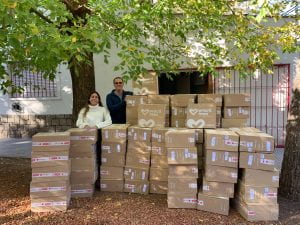
CPR Equipment – Red Cross acquired over 50 new CPR training mannequins for first-aid training
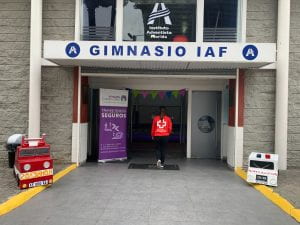
Road Safety Workshop – We gave a wound-care workshop to toddlers in celebration of road safety day
Tourism:
Buenos Aires has a lot of tourist attractions that are popular to foreigners and locals. Although I have resigned myself to not being able to visit all of them (without mentioning the ridiculous amount of things one can do in other parts of Argentina), I have quite enjoyed visiting several of these attractions. My favorite so far has been going to the Rose Garden and the Parque 3 de Febrero, both areas filled with greenery, pleasant smells, and tons of ducks (see attached picture of Don Pato). I got lucky enough to go during a day where the sky was clear and during sunset, so I was able to enjoy my own company next to the small lakes and ducks while eating chocolate. What was the most mesmerizing thing, though, was that the park and rose garden were located right next to the hectic highway and city, providing refuge from the urban chaos. On the topic of nature, I was delighted to have gone to a town away from Buenos Aires called Santiago de Areco where my travel partner Valeria. We got to horseback ride, explore nature, and try some delicious steak.
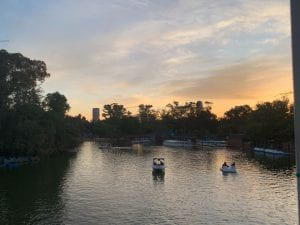
Parque 3 de Febrero at Sunset
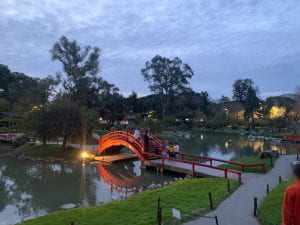
Japanese Garden
Socializing
Socializing was definitely an uphill battle for me. Although this is not the first time I am far away from home, it is the first time I am leaving home to work rather than to study. As a student, whether at a summer program or college, socializing would be easier because there would be common spaces (classes, office hours, clubs, etc.) where I could meet people. This time, however, the situation was completely different. Because a lot of the work the Red Cross does is thanks to volunteers, the staff and people involved in every activity changes all the time. In other words, other than the supervisor, I was meeting new people constantly. While this initially seemed like an opportunity to create more long-lasting friendships, I realized that meeting a person once for 4 hours at most does not really allow me to make a lot of connections. Nonetheless, thanks to the first aid course I took and going out of my way to be more extroverted, I have been able to form some friendships and connect with people. Furthemore, I have become more capable of enjoying my own company and finding peace in being with myself.
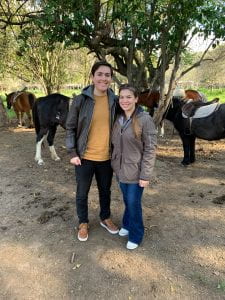
Santiago de Areco – Post Horseback Riding
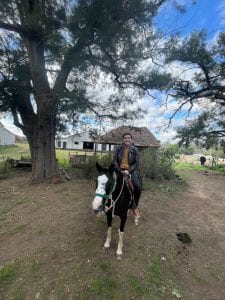
Horseback Riding in Santiago de Areco
Challenges:
Like every experience, there were some challenges I could not have prepared myself for during my trip to Buenos Aires. For one, my identity as Bolivian was challenged through microaggressions with more frequency that I would have liked. Because I grew up speaking English at school and speaking Spanish everywhere else in my life, my accent is not easily identified as Bolivian. I have been asked if I was from Ecuador, the U.S, some place in Europe, and Costa Rica. While these comments are not ill-intentioned themselves and not problematic themselves, the tone with which people reply when I say I am Bolivian often strikes me as weird to say the least, since some locals will respond “but you don’t sound Bolivian” in a tone that hints at it being something positive. This has led me to have somewhat of an identity crisis. My English is not “perfect” enough to blend in when I am in the U.S and now my Spanish does not sound Bolivian enough. Nonetheless, as I continue to do some introspection, I realize that I do not have to fit any mold to be Bolivian. I feel comfortable in my identity and I do not owe explanations to anybody.
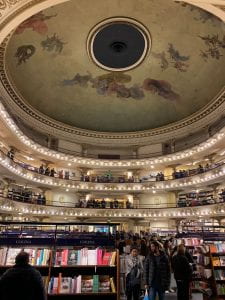
El Ateneo – Very similar to Barnes and Nobles but way more artistic
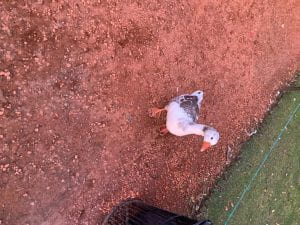
Don Pato 😀
Final Thoughts
My experience with the Red Cross has been overall wonderful. This experience has reinforced my goal of helping underserved communities through population-level initiatives that promote prevention and effective bystander intervention.

